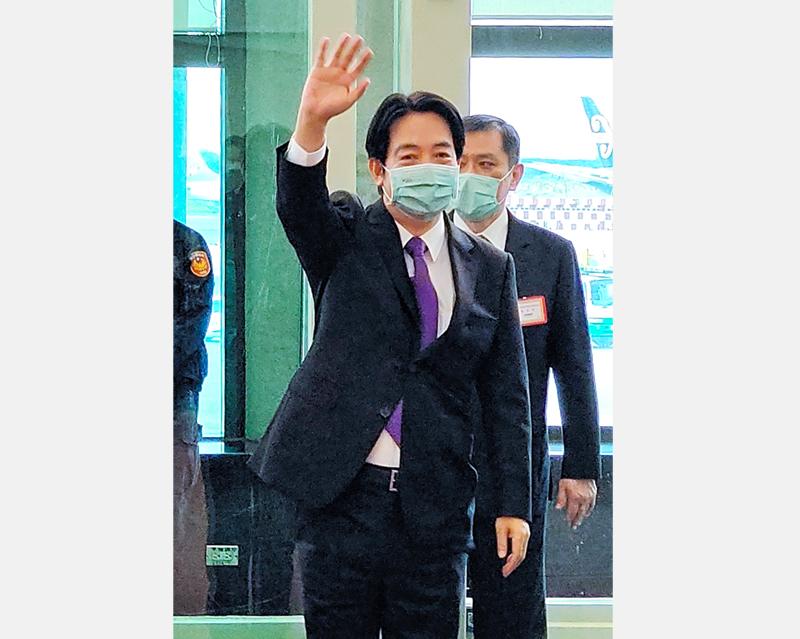Vice President William Lai (賴清德) yesterday left for Honduras via the US, saying that the visit shows Taiwan’s commitment to improving its relationship with the Central American ally.
Lai is leading a delegation on behalf of President Tsai Ing-wen (蔡英文) to attend the inauguration of Honduran president-elect Xiomara Castro. Lai is to return on Saturday.
Speaking at Taiwan Taoyuan International Airport before departure, Lai said that despite the COVID-19 pandemic, the delegation is traveling to Honduras to congratulate Castro and her incoming government, which shows Taiwan’s commitment to boosting bilateral ties and its support for the Central American nation.

Photo: Tony Yao, Taipei Times
He said the delegation would also donate medical aid to Honduras to help it fight the pandemic, without providing details.
“We will use concrete action and specific measures to show our support for deeper ties and the new government,” he said, adding that bilateral ties would continue based on pragmatism and reciprocity.
Describing Honduras as a key Central American ally for Taiwan, Lai said the two countries had gone through difficulties, and defied threats and enticements during eight decades of formal ties, while maintaining close and amicable relations.
Lai, who is to meet Castro today, said he would have “interactions and exchanges” with “leaders and deputy leaders” of allies and “friendly countries,” although he did not mention US Vice President Kamala Harris, who is also to attend the inauguration.
This is the first time that Lai is traveling overseas in an official capacity since taking office in May 2020.
Lai is to stop over in Los Angeles and San Francisco on the way to and from Tegucigalpa respectively, the Presidential Office said.
He is to spend more time in the US than in Honduras, his itinerary shows.
During the stopovers, he is to speak with US officials and politicians, as well as representatives of overseas Taiwanese communities, by telephone or videoconference, the office said.
Castro’s victory in the presidential election on Nov. 28 last year made her the first female president of Honduras, which established diplomatic ties with the Republic of China in 1941.
Castro, 62, is the wife of former Honduran president Jose Manuel Zelaya. Her victory had raised concerns in Taipei, as Castro had said during her election campaign that she would switch diplomatic recognition to China if she won.
However, two senior members of Castro’s transition team last month said that her government would maintain diplomatic ties with Taiwan.
Separately yesterday, Ministry of Foreign Affairs spokeswoman Joanne Ou (歐江安) told a news conference that the ministry has established good relations with the incoming Castro administration.
Taiwan would work closely with its ally to promote collaboration in areas that the incoming government has pledged to prioritize, such as economic recovery, education and public health, she said.
Additional reporting by Reuters

EXPRESSING GRATITUDE: Without its Taiwanese partners which are ‘working around the clock,’ Nvidia could not meet AI demand, CEO Jensen Huang said Taiwan Semiconductor Manufacturing Co (TSMC, 台積電) and US-based artificial intelligence (AI) chip designer Nvidia Corp have partnered with each other on silicon photonics development, Nvidia founder and CEO Jensen Huang (黃仁勳) said. Speaking with reporters after he met with TSMC chairman C.C. Wei (魏哲家) in Taipei on Friday, Huang said his company was working with the world’s largest contract chipmaker on silicon photonics, but admitted it was unlikely for the cooperation to yield results any time soon, and both sides would need several years to achieve concrete outcomes. To have a stake in the silicon photonics supply chain, TSMC and

‘DETERRENT’: US national security adviser-designate Mike Waltz said that he wants to speed up deliveries of weapons purchased by Taiwan to deter threats from China US president-elect Donald Trump’s nominee for US secretary of defense, Pete Hegseth, affirmed his commitment to peace in the Taiwan Strait during his confirmation hearing in Washington on Tuesday. Hegseth called China “the most comprehensive and serious challenge to US national security” and said that he would aim to limit Beijing’s expansion in the Indo-Pacific region, Voice of America reported. He would also adhere to long-standing policies to prevent miscalculations, Hegseth added. The US Senate Armed Services Committee hearing was the first for a nominee of Trump’s incoming Cabinet, and questions mostly focused on whether he was fit for the

IDENTITY: Compared with other platforms, TikTok’s algorithm pushes a ‘disproportionately high ratio’ of pro-China content, a study has found Young Taiwanese are increasingly consuming Chinese content on TikTok, which is changing their views on identity and making them less resistant toward China, researchers and politicians were cited as saying by foreign media. Asked to suggest the best survival strategy for a small country facing a powerful neighbor, students at National Chia-Yi Girls’ Senior High School said “Taiwan must do everything to avoid provoking China into attacking it,” the Financial Times wrote on Friday. Young Taiwanese between the ages of 20 and 24 in the past were the group who most strongly espoused a Taiwanese identity, but that is no longer

A magnitude 6.4 earthquake and several aftershocks battered southern Taiwan early this morning, causing houses and roads to collapse and leaving dozens injured and 50 people isolated in their village. A total of 26 people were reported injured and sent to hospitals due to the earthquake as of late this morning, according to the latest Ministry of Health and Welfare figures. In Sising Village (西興) of Chiayi County's Dapu Township (大埔), the location of the quake's epicenter, severe damage was seen and roads entering the village were blocked, isolating about 50 villagers. Another eight people who were originally trapped inside buildings in Tainan